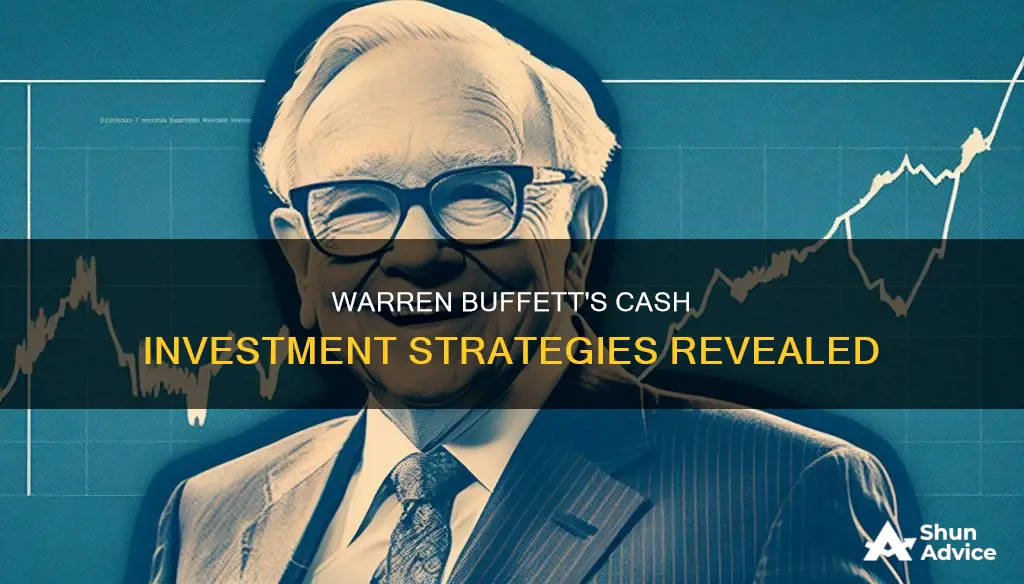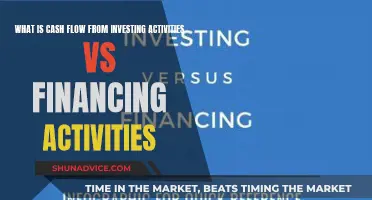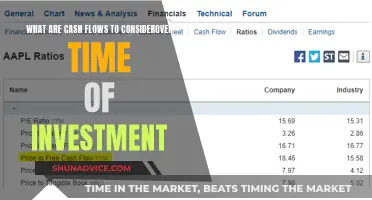
Warren Buffett is one of the world's most successful investors and his investment strategy has reached almost mythical proportions. In recent years, however, Buffett has been selling shares and stockpiling cash. As of November 2024, his holding company Berkshire Hathaway had a cash pile of over $300 billion, with more than $288 billion of that invested in short-term US Treasury bills. This has led to speculation about Buffett's view of the market and his future investment plans.
| Characteristics | Values |
|---|---|
| Total cash pile | $325 billion |
| Cash pile as a percentage of total assets | 17.5% |
| Average cash on balance sheet as a percentage of assets since 1997 | 13% |
| Cash pile as a percentage of market valuation | 40% |
| Cash invested in short-term Treasury bills | $288 billion |
| Cash invested in US Treasury bills | $234.6 billion |
| Cash invested in stocks | $69.9 billion |
What You'll Learn

Berkshire Hathaway's cash and US Treasury holdings
Warren Buffett's Berkshire Hathaway has been a net seller of stocks, instead opting to hold cash and US Treasury bills. In the second quarter of 2024, Berkshire Hathaway's cash and US Treasury holdings reached a record high of $276.9 billion, with over half of that amount in Treasury bills at $234.6 billion. This amount surpasses the amount of Treasury bills held by the US Federal Reserve.
Berkshire Hathaway's holdings of US Treasury bills have increased significantly, up 81% year-to-date through June. The company now holds $234.6 billion in short-term US Treasury bills, compared to $130 billion at the end of 2023. This increase in Treasury bill holdings has contributed to a rise in Berkshire's interest income, which increased by $2 billion, or 79%, in the first six months of 2024.
The preference for Treasury bills over stocks reflects Buffett's view that they are the "safest investment there is". Additionally, the annualized risk-free interest offered by government debt may be more attractive than the current opportunities in the stock market.
Berkshire Hathaway's cash position has been steadily increasing over the past nine consecutive quarters. The company's cash on hand reached a record level of $320.3 billion in the third quarter of 2024, up from $271.5 billion in the previous quarter. Of this amount, $288 billion is invested in short-term Treasury bills.
The accumulation of cash and US Treasury bills by Berkshire Hathaway has led to speculation about Buffett's outlook on the market. Some analysts suggest that Buffett may be concerned about the market becoming overheated, raising cash for successors, or simply unimpressed with other investment options.
Smart Ways to Invest $10,000 for Maximum Returns
You may want to see also

Buffett's investment in Apple
Warren Buffett's investment strategy has reached mythical proportions, and he is known as one of the world's most successful investors. He subscribes to the Benjamin Graham school of value investing, which looks for securities with prices that are unjustifiably low based on their intrinsic worth.
Buffett's company, Berkshire Hathaway, has invested in Apple, and as of 2022, it had accumulated a 5% ownership stake in the iPhone maker, worth $160 billion. This investment has been one of Buffett's winningest investments, making over $120 billion on paper as Apple reached a $3 trillion market valuation.
Berkshire Hathaway began buying Apple stock in 2016, and by mid-2018, it had spent about $36 billion to acquire more than 1 billion Apple shares, adjusted for a 4-to-1 stock split. However, Berkshire Hathaway has since trimmed its stake in Apple, selling about $13 billion worth of stock and missing out on an estimated $6 billion to $8 billion in gains. Despite this, Apple remains the largest holding in Berkshire's US stock portfolio, accounting for over 40% of its total value.
Buffett has praised Apple on several occasions, calling it "probably the best business" he knows and labelling it a "family jewel". He has also praised Apple CEO Tim Cook as "one of the best managers in the world".
Finding Initial Investment: Utilizing Positive Cash Flow Strategies
You may want to see also

Buffett's investment in Bank of America
Warren Buffett's investment strategy has reached mythical proportions, and he is known as one of the world's most successful investors. He is a follower of the Benjamin Graham school of value investing, which looks for securities with low prices that are unjustifiable based on their intrinsic worth.
Buffett continued to invest in BoA, topping up his stake in 2020 when the pandemic-hit stock was trading at around $25. He purchased about $2.1 billion worth of stock over 12 consecutive trading days.
However, in 2024, Buffett began selling his BoA shares. Between July and October, he sold about 239 million shares, or around 23% of his stake in the banking giant, generating roughly $10 billion in proceeds. As of October 2024, Berkshire Hathaway still owned 794 million shares, worth just over $31 billion, making it the bank's largest shareholder.
The reason for Buffett's sale of BoA shares is not clear, as he has not publicly commented on it. One possible explanation is that he was taking profits after a good run, as the stock had gained about 50% in the year leading up to the sale. Another reason could be the prospect of higher capital-gains taxes, as Buffett has previously cited this as a reason for cashing out some of his other investments. It is also possible that he is rebalancing his portfolio, gathering cash for a large acquisition, or that he has lost confidence in the bank's outlook.
Local License Repairs: Investing in Community Safety and Compliance
You may want to see also

Buffett's investment in Occidental Petroleum
Warren Buffett's investment strategy has reached almost mythical proportions, and he is known as one of the world's most successful investors. He subscribes to the Benjamin Graham school of value investing, which looks for securities with prices that are unjustifiably low based on their intrinsic worth.
Buffett's holding company, Berkshire Hathaway, has been stockpiling cash, and its cash and U.S. Treasury holdings rose to a record high in the second quarter of 2024, reaching $276.9 billion. While Berkshire Hathaway has been selling more stock than it has been buying, it has also added a few new positions and raised some of its equity stakes in the second quarter of 2024. One such company is Occidental Petroleum (OXY).
Berkshire Hathaway has been steadily increasing its stake in Occidental Petroleum, and as of June 17, 2024, it had acquired another 2.95 million shares in the company, bringing its stake to nearly 29% of the common stock, worth approximately $15.37 billion. This move is seen as a way to diversify Berkshire's energy portfolio, which includes utilities, electricity distributors, and renewable power projects.
In August 2022, Berkshire Hathaway received regulatory approval to buy up to 50% of Occidental Petroleum, but Buffett has stated that he has no intention of taking over or acquiring the Houston-based company. As of July 2024, Berkshire Hathaway held a 28.2% stake in Occidental Petroleum, $10 billion of Occidental preferred stock, and warrants to buy another 83.9 million common shares for $5 billion.
Occidental Petroleum has been making strategic acquisitions and divestitures to strengthen its balance sheet and reduce debt. In December 2023, Buffett spent $588.7 million on more than 10 million shares of OXY stock following Occidental's $12 billion acquisition of Permian Basin producer CrownRock, which added 94,000 net Midland Basin acres and increased production capacity.
How Much Cash Flowed from 2010 Investments?
You may want to see also

Buffett's investment strategy
Warren Buffett's investment strategy has been analysed and admired by people around the world. He is one of the world's richest people, with a net worth of over $130.7 billion as of July 2024. Here is an overview of Buffett's investment strategy:
The Benjamin Graham School of Value Investing
Buffett subscribes to the Benjamin Graham school of value investing. This approach focuses on identifying and investing in securities that are undervalued, with prices that are unjustifiably low compared to their intrinsic worth. Buffett evaluates companies as a whole rather than getting caught up in the complexities of stock market supply and demand.
Company Performance
When assessing a company's performance, Buffett considers several key factors, including return on equity (ROE) and the debt-to-equity (D/E) ratio. He looks for companies with strong and consistent performance relative to their competitors. Additionally, he prefers companies with minimal debt and profit margins that are consistently increasing.
Public vs Private Companies
Buffett typically invests in companies that have been established for at least 10 years. He tends to avoid technology companies, as he has stated that he doesn't fully understand their mechanics. He focuses on businesses he can comprehend and prefers those with a unique selling point or a "protective moat," giving them a competitive advantage.
Commodity Reliance
Buffett generally avoids investing in companies that heavily rely on commodities such as oil or gas. He looks for companies that offer something distinct from their competitors and are not easily replicated.
Long-Term Investment Horizon
Buffett is known for his long-term investment approach. He advises investors to plan on owning a stock for at least 10 years and to focus on the company's overall potential rather than short-term capital gains.
Buying Opportunities
Buffett advocates for a patient and strategic approach to investing. He suggests waiting for a reasonable valuation and then buying when the market corrects. He encourages investors to resist panic-selling and instead focus on buying more during market downturns.
Berkshire Hathaway's Cash Position
Buffett's holding company, Berkshire Hathaway, has been consistently adding to its cash pile. As of November 2024, it held over $300 billion in cash and equivalents, with a significant portion invested in short-term Treasury bills. This has led to speculation about Buffett's market outlook and potential future investments.
In summary, Warren Buffett's investment strategy revolves around value investing, long-term horizons, and a focus on company fundamentals rather than short-term market fluctuations. His approach has been highly successful, contributing to his immense wealth and legendary status in the investment world.
Transferring Cash Investments: Charles Schwab to Schwab
You may want to see also
Frequently asked questions
Warren Buffett has been stockpiling cash in his holding company, Berkshire Hathaway, which has sold more stock than it has bought over several quarters.
Berkshire Hathaway has been selling more stock than it has been buying, including stakes in Apple, Bank of America, Chevron, and Capital One.
Berkshire Hathaway has added new positions in Ulta Beauty and Heico, and raised stakes in Occidental Petroleum and Chubb, among others.
Warren Buffett follows the Benjamin Graham school of value investing, which looks for securities with prices that are unjustifiably low based on their intrinsic worth. Buffett focuses on company performance, company debt, and profit margins.







